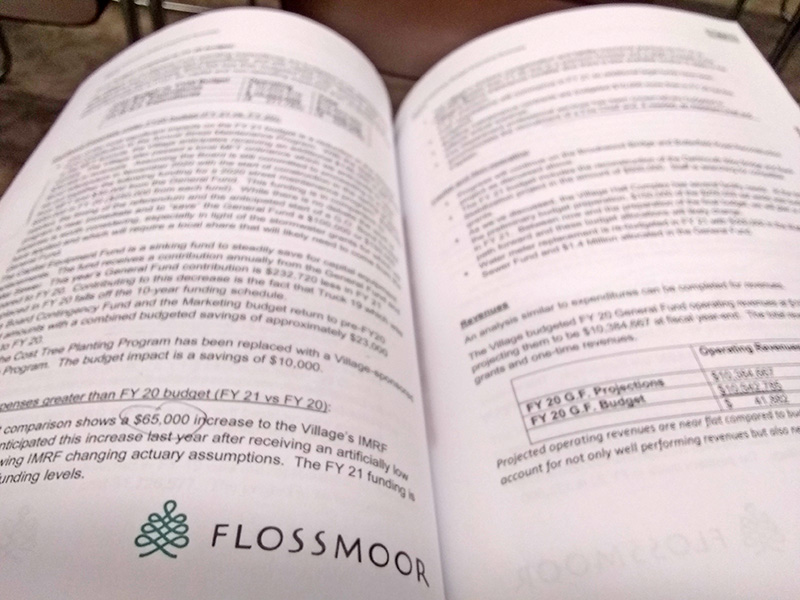Flossmoor kicked off its annual budget process with a note of optimism following a year that brought mostly positive news about the village’s fiscal well-being.
That good news, however, was tempered by nagging concerns about the best way to make municipal ends meet when revenues are stagnant and the community’s overall equalized assessed valuation (EAV) still has not fully recovered from the 2008 recession.
Flossmoor kicked off its annual budget process with a note of optimism following a year that brought mostly positive news about the village’s fiscal well-being.
That good news, however, was tempered by nagging concerns about the best way to make municipal ends meet when revenues are stagnant and the community’s overall equalized assessed valuation (EAV) still has not fully recovered from the 2008 recession.
Each year, fashioning a spending plan for the village is the most important financial business undertaken by Flossmoor’s staff and village board. Trustees got their first look at the budget March 2 and there will be subsequent discussions at the next three board meetings. Approval of the budget is expected on April 20.
Two main funds get the most attention from village officials. The General Fund covers most day-to-day activities in Flossmoor and deals with salaries and operations in the majority of village departments. The Water and Sewer Fund supports transmission lines in and out of homes and businesses and the infrastructure that keeps the water flowing.
At this month’s first budget discussion, Village Manager Bridget Wachtel provided a look at the two funds.
“The health of the Water and Sewer Fund has significantly improved over the last two years,” she said. Projected operating expenditures in the new water fund budget are about $3.57 million.
Improvements to Flossmoor’s notoriously leaky water delivery system are paying off, she said. The village completed a multi-year program, financed by a voter-approved bond issue, to replace water mains in the worst condition. After serious leaks were discovered at the concrete Vollmer Road reservoir in 2016, those were also repaired.
Prior to 2018, only about 66 percent of Lake Michigan water that was purchased made it into homes and businesses. With the infrastructure improvements, that number went up to 83 percent, Wachtel said. Flossmoor used to pump about one million gallons of water a day. After the improvements, that number is now down to about 800,000 gallons a day.
This year, Flossmoor is expected to finally complete the installation of updated water meters in the remainder of homes in the village. Money for the project was budgeted last year but the installation was once again deferred. The total cost of the project is almost $1.73 million, with most of the money coming from the General Fund. However, savings in the Water and Sewer Fund are making it possible to apply $300,000 from that fund to the project, Wachtel said.
About 93 percent of the General Fund budget goes to personnel and fixed costs. Operating expenditures in the new budget are projected at $10,652,916.
Wachtel said projections about the 2020 fiscal year, which will soon conclude, “are better than the FY20 budget and FY21 preliminary budget is an improvement from FY20.”
She pointed to several instances where there were significant expenses under budget in FY20. For example, there was a savings of $104,277 due to personnel changes in the police department, and specifically the retirement of former Chief Michael Pulec. That created savings in salary lines for the chief’s position, deputy chief and sergeants.
In the fire department, former Chief Chris Sewell’s retirement is expected to result in a $26,000 savings. Additional savings of about $76,000 are also expected due to fire department personnel changes, Wachtel said.
Revenues to support the General Fund remain relatively flat despite sales tax numbers that are exceeding budget projections, she said.
In 2020 fiscal year, sales tax projections are expected to be $74,000 more than what was budgeted last year. Most of that sales tax is coming from the Meijer superstore. Since the 2018 fiscal year, Flossmoor has increased its sales tax by 85 percent. The current sales tax revenues come to a total of $1.275 million.
“Since the opening of the Meijer and nearby development, sales tax has increased dramatically,” Wachtel told trustees. “Unfortunately, there has not been a corresponding growth in our fund balance. These monies have been serendipitous to absorbing increased costs and fluctuations in other revenues.”
Prior to the opening of the Meijer store, the Local Government Distributive Fund (LGDF), funded by the Illinois state income tax, was Flossmoor’s second biggest revenue source apart from property taxes.
In recent years, the state has “raided” that fund and Wachtel said municipalities like Flossmoor need to defend against state threats to take back “a portion or all” of LGDF revenues that are crucial to local governments.


